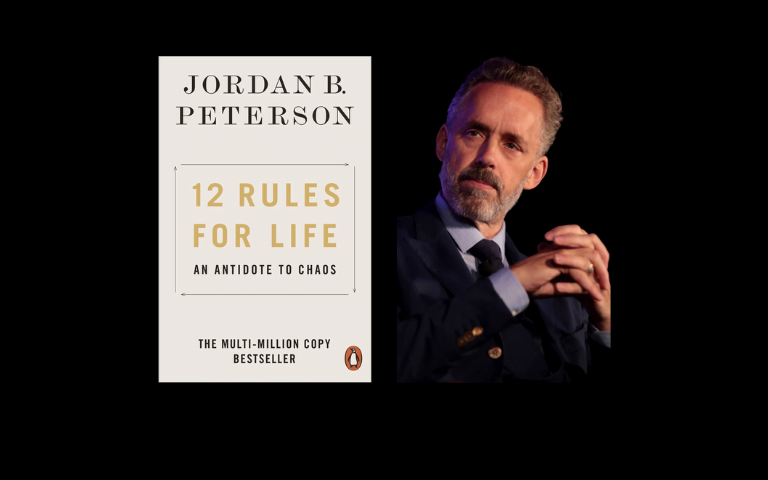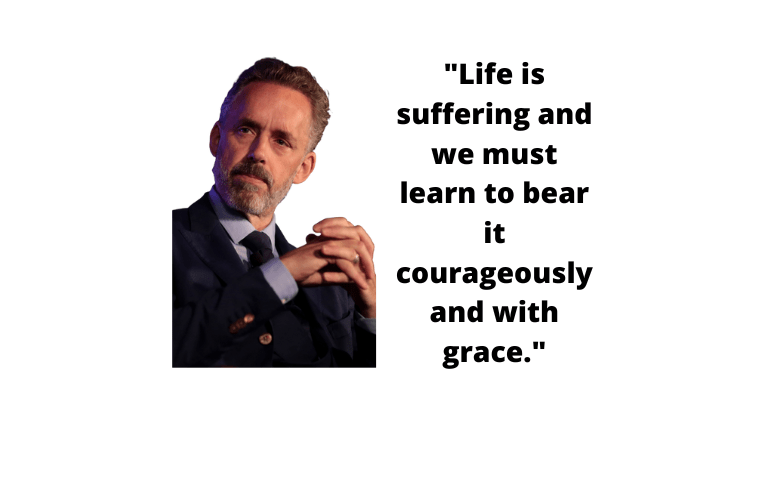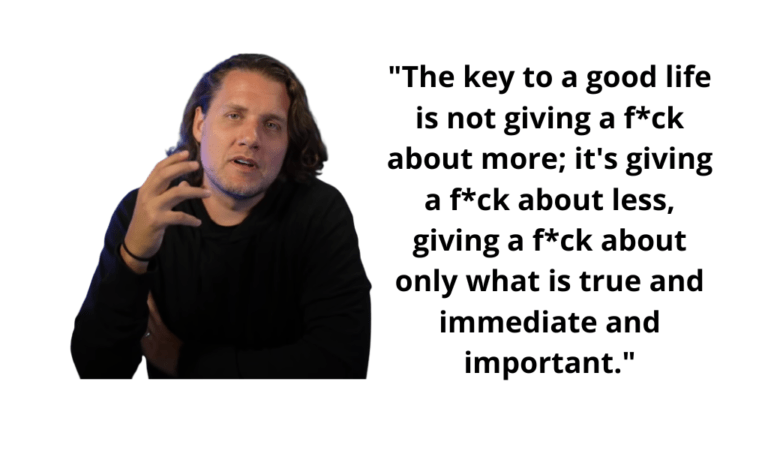Disclaimer: This post may contain affiliate links. For more information, please visit our Disclaimer Page.
Introduction
Jordan Peterson‘s “12 Rules for Life: An Antidote to Chaos” is an insightful and motivational manual on making the most of your time on Earth. Peterson offers advice and guidance on a wide range of issues in this book, from personal accountability and honesty to building meaningful connections with others and discovering your life’s true calling.
Peterson provides new insight into some of life’s most fundamental concerns via exciting and valuable tales. He challenges his readers to examine their core ideas and values and take the initiative in pursuing a meaningful existence.
Insightful and practical advice makes “12 Rules for Life” a must-read for anybody looking to improve their quality of life in any area, whether personal development, interpersonal connections, or finding one’s position in the world.
1 – Stand up straight with your shoulders back
This rule is about taking personal responsibility and being accountable for your actions.
You exude an air of assuredness when you go about with your head held high and your shoulders back. Communicates to others and yourself that you can handle anything that comes your way. It can also help your body with posture and back problems.
This guideline isn’t just about how you stand but about being proactive and accepting responsibility for your actions and life choices. It implies you must take responsibility for your actions and stop trying to shift the blame or find out. Truthfulness entails not sugarcoating your feelings or others and facing problems squarely.
The essence of this guideline is to stop letting other people dictate who you are and start creating your path. It calls for self-control, introspection, and acceptance of personal responsibility for one’s acts and the results one gets.
2 – Treat yourself like you would someone you are responsible for helping
This rule is about being kind to yourself and practicing self-care.
Taking care of one’s body and mind is stressed in this guideline. Self-awareness entails paying attention to your physical and mental health by ensuring enough sleep, exercise, and nutritious food. This includes being kind to yourself when things don’t go as planned, or you make a mistake rather than beating yourself up.
Finding healthy strategies to deal with stress and negative emotions is essential to self-care. To do this, you may consult a therapist, take some time off to replenish your batteries or partake in pursuits that make you happy and fulfilled.
When using this guideline, think of yourself as a person you are responsible for assisting and treat yourself with the same kindness and consideration you would give them. Self-care is about accepting your value and taking measures to improve your life.
3 – Make at least one thing you do better in every single place you are
This rule is about constantly improving and striving for excellence in all areas of your life.
This guideline promotes a “growth mindset,” or the conviction that one can alter their performance level via applying effort and acquiring new knowledge. It is refusing to settle for average performance and making strides toward improvement. Also, you must be willing to try new things and learn from your mistakes.
All facets of your life, including professional endeavors, interpersonal interactions, leisure activities, and self-improvement, are subject to this guideline’s strict application. It involves making steady strides toward one’s aspirations and improving oneself daily.
It must be stressed, however, that the goal of this guideline is not perfection or even excellence. Making an honest attempt to develop and mature entails accepting that there will be setbacks and learning from them. Significant themes are perseverance, resilience, and improving oneself through experience with failure.
4 – Compare yourself with who you were yesterday, not with who someone else is today
This rule focuses on personal growth and progress rather than comparing yourself to others.
It’s human nature to compare yourself to others, yet doing so may be counterproductive and disheartening. Inadequacy, jealousy, and anger are the results, and they can keep you from focusing on your own life and progress.
One of the main advantages of comparing yourself to yesterday’s you rather than others is that it encourages you to concentrate on your improvement. Your goals and benchmarks may be established, and your development over time can be monitored. This is an excellent inspiration to keep you on your path.
This method also makes you more sturdy and flexible, which is always helpful. If you’re constantly evaluating your progress against that of others, or if you keep running across roadblocks, it’s easy to get down on yourself. However, focusing on personal development increases one’s chances of returning from setbacks and blunders.
Finally, looking at yourself against yesterday helps you develop an attitude of thankfulness and appreciation for the growth you’ve experienced. It enables you to appreciate your successes, no matter how trivial they may appear to others. This may be a tremendous inspiration that keeps you strong and gives you faith in the future.
5 – Do not let your children do anything that makes you dislike them
This rule is about setting boundaries and teaching children to be responsible and respectful.
This guideline concerns being a responsible parent and giving your kids structure and firm ground rules. The key is to establish rules and enforce consequences for disobedience and disrespect. It also involves being proactive in instilling moral values in your children and being consistent and fair in disciplining.
Your goal in enforcing this rule is not to be authoritarian but to help your children learn to regulate their behavior. The goal is to help children develop into productive and contributing members of society who are ready to take on the difficulties of adulthood.
Remember that this doesn’t imply you can never offer your kids love or affection or that you should never let them make errors. Finding that happy medium and establishing reasonable limits will aid your children’s development and learning.
6 – Set your house in perfect order before you criticize the world
This rule is about taking care of your affairs before trying to fix the world’s problems.
This principle is about putting your needs first and ensuring you’re okay before worrying about other people’s concerns. It involves prioritizing your wants and obligations before attempting to solve the issues of others.
To follow this guideline is not to turn a blind eye to the plight of others or to show callous disregard for human suffering. It’s about realizing that you can’t do much good for others if you aren’t doing well in your own life.
You may put yourself in a better position to positively impact the world by attending to your needs and working on your development. Giving back can take many forms, including volunteering your time or money or just being an excellent example for people around you.
The overarching message of this guideline is to put one’s needs first and realize that one cannot effectively aid others until one has cared for oneself.
7 – Pursue what is meaningful, not practical
This rule is about finding and following your passions and purpose rather than just doing what is easy or convenient.
This guideline focuses on pursuing one’s true interests and calling in life rather than settling for the simple option. This involves acting on your core beliefs and concentrating your energy and time on what truly matters to you. It also entails putting in the effort and making the necessary sacrifices to realize your dreams, even if it isn’t the quickest or most comfortable option.
Conversely, you’re opting for the road of least resistance rather than the one that will bring you the most happiness and fulfillment. Sacrificing ideals or aspirations for comfort or convenience is an example of putting short-term gain ahead of long-term satisfaction.
This guideline aims to help you strike a balance between your ideals and the realities of life. In other words, it’s about following your heart and doing what makes you happy.
8 – Tell the truth, or at least don’t lie
This rule is about honesty and integrity in all aspects of your life.
Following this guideline means always being forthright and truthful, even admitting wrongdoing. Having integrity is speaking the truth and not trying to cover anything up.
The repercussions of lying may be devastating, both personally and socially. It may hurt those close to you, destroy faith in you, and ruin your reputation. On the other hand, integrity and honesty are two pillars around which trust and other positive relationship-building characteristics can be constructed.
This guideline does not encourage constant frankness or call for eliminating all tact. Finding a middle ground between being truthful and being kind to other people is what this is all about.
Respect and trust can only be earned via consistent behavior marked by honesty and integrity, which is what this guideline is about.
9 – Assume that the person you are listening to might know something you don’t
This rule is about being open-minded and respecting others’ opinions and viewpoints.
The spirit of this guideline is one of tolerance and acceptance of divergent points of view.
Rule of thumb: Admit you don’t know everything and be open to input from others. You’re not closed off to other people’s ideas and thoughts and can look past the fact that they disagree with you to find common ground.
Just because you’re trying to broaden your perspective doesn’t mean you must give up your convictions and principles. It’s as easy as being receptive to other people’s ideas and points of view and being ready to grow.
A vital aspect of this guideline is showing deference to others even if you disagree. Kindness involves not only saying, “I don’t care what you think,” but listening to what the other person has to say before making up your mind.
Being receptive to and appreciative of other people’s viewpoints and ideas is at the heart of this guideline, as is the understanding that you may expand your horizons by doing so.
10 – Be Precise in your speech
This rule is about communicating clearly and concisely and avoiding vague or ambiguous language.
According to this guideline, you should avoid using vague language and speak and succinctly.
You are paying attention to how you express yourself and your words. Maintaining clarity and conciseness involves using clear language that might mislead or confuse your audience. It also entails considering how others will receive your comments and avoiding statements that might be taken the wrong way, especially if they could be offensive.
There are a few advantages to speaking clearly. By doing so, you may better express yourself and foster more mutual understanding. Speaking clearly and succinctly may help boost your reputation and credibility since people will be more inclined to take you seriously and respect your thoughts.
Being exact in your communication does not mean coming across as stiff or stuffy. Simply put, this is giving thought to your words and how you communicate yourself to make your messages more precise and concise.
This guideline emphasizes careful word choice and deliberate expression to pursue clear, concise discourse.
11 – Try to make at least one thing better in every place you go
This rule is about meaningfully leaving a positive impact wherever you go and contributing to the world.
Making minor improvements wherever you go significantly impacts how you feel about yourself and the world. If you want to feel more connected to the world around you and find purpose in life, making an effort to contribute and make a good impact can do just that.
As a bonus, this method has the potential to have a domino effect and motivate other people to make significant changes as well. A good chain reaction can be started when one person takes action to better their surroundings or the lives of others.
In conclusion, increasing your resilience and adaptability by improving even one aspect of each new environment you visit is a worthwhile goal. It is easier to deal with difficulties and discover ways to advance when you have taken the initiative to better your surroundings.
You may strengthen your resilience, flexibility, and feeling of purpose and belonging by always striving to improve at least one aspect of your environment everywhere you go.
12 – Pet a cat when you encounter one on the street
This rule is about finding joy and beauty in the small things and appreciating the present moment.
Taking pleasure in and finding satisfaction in life’s little pleasures is at the heart of this guideline’s message. Petting a stray cat on the street might not seem like much, but it can give you and the cat a sense of happiness and closeness.
The spirit of this guideline is to appreciate the small things in life and to find meaning in helping others and enjoying the current moment. It’s about realizing that the little things in life may provide as much joy as the big ones and that you don’t need to wait for the big things to be accomplished to be happy.
It would be best only to pet a cat if it’s a safe and suitable situation, and this rule isn’t meant to be followed literally. The goal of this guideline is to encourage its adherents to be conscious of the present moment and to find happiness in its simple pleasures.
This guideline is about realizing that happiness frequently lies in the little things in life, such as simple pleasures and acts of kindness.
Conclusion
Finally, if you’re looking to find greater purpose and happiness in life, “12 Rules for Life: An Antidote to Chaos” by Jordan Peterson is a book you must read. This book provides a new way of looking at life’s most fundamental concerns through its insightful analysis and sound advice.
“12 Rules for Life” can help you whether you’re looking for meaning in your life, how to develop yourself, or how to strengthen your relationships and make a difference in the world.
This book is for you if you’re ready to stop waiting for life to give you meaning and purpose and start creating it yourself. With its easy-to-read tone and insightful advice, “12 Rules for Life” is a trusted companion you’ll return to repeatedly as your face and seize life’s many difficulties and chances. Get this book now and start living a happier, more fulfilled life right away!
F.A.Q. about “12 Rules for Life: An Antidote to Chaos” by Jordan Peterson
What is the main theme of the book “12 Rules For Life: An Antidote To Chaos”?
The main theme of the book “12 Rules for Life: An Antidote to Chaos” by Jordan Peterson is providing practical and insightful advice for improving one’s life. It covers several key aspects of life, including personal accountability, self-care, personal growth, and pursuing meaningful endeavors. The book encourages readers to focus on their own progress rather than comparisons, to strive for excellence, and to appreciate the present moment.
What does the book emphasize about personal accountability?
The book emphasizes the importance of personal accountability in life. It advocates for taking responsibility for one’s actions and circumstances and organizing one’s life before criticizing the world around them. This perspective promotes personal growth and self-improvement.
How does “12 Rules for Life” guide readers about self-care?
Regarding self-care, “12 Rules for Life” suggests that treating oneself with kindness is crucial. It implies that caring for oneself both physically and mentally can significantly enhance the quality of one’s life. This includes finding joy in small things and practicing honesty and open-mindedness.
Can you explain the concept of continuous improvement as described in “12 Rules For Life: An Antidote To Chaos”?
Continuous improvement in the context of “12 Rules for Life” is about striving for excellence and focusing on personal progress rather than comparing oneself with others. The book suggests that one should continually seek to learn, grow, and evolve to enhance their quality of life.
What does the book propose about meaningful pursuits?
“12 Rules for Life” proposes that pursuing meaningful endeavors is a significant aspect of life. It asserts that engaging in tasks or projects that are meaningful to oneself can lead to a sense of fulfillment and purpose, thus contributing to overall happiness and satisfaction.
“12 Rules for Life: An Antidote to Chaos” Book Quotes
“Don’t reorganize the state until you have ordered your own experience. Have some humility. If you cannot bring peace to your household, how dare you try to rule a city?”
“If you’re not the leading man in your own drama, you’re a bit player in someone else’s—and you might well be assigned to play a dismal, lonely and tragic part.”
“Not everyone who is failing is a victim, and not everyone at the bottom wishes to rise, although many do, and many manage it.”
“Things fall apart: this is one of the great discoveries of humanity. And we speed the natural deterioration of great things through blindness, inaction and deceit.”
“Violence, is no mystery. It’s peace that’s the mystery. Violence is the default. It’s easy. It’s peace that is difficult: learned, inculcated, earned.”
“A life lived thoroughly justifies its own limitations.”
“Listen, to yourself and to those with whom you are speaking. Your wisdom then consists not of the knowledge you already have, but the continual search for knowledge, which is the highest form of wisdom.”
“Every bit of learning is a little death. Every bit of new information challenges a previous conception, forcing it to dissolve into chaos before it can be reborn as something better. Sometimes such deaths virtually destroy us.”
You can read Jordan Peterson‘s Biography by clicking the image below! Enjoy!!!
Disclaimer: This blog post is a summary or resume of the book and is not intended to dispense the reading of the original book. This post aims to provide a general overview of the book’s main ideas and themes and encourage readers to read the complete book to gain a deeper understanding of the material. The information presented in this post is intended to be something other than a substitute for the original book and should be used as a supplement to, not a replacement for, the entire book. We strongly encourage readers to read the complete book to benefit from its ideas and teachings fully.







